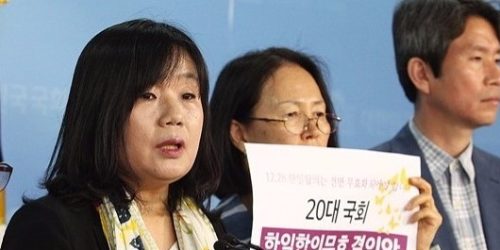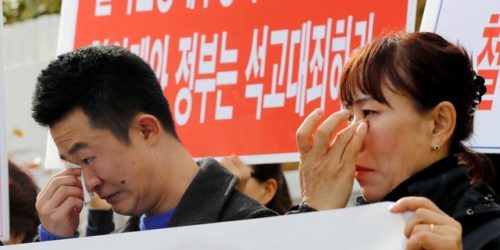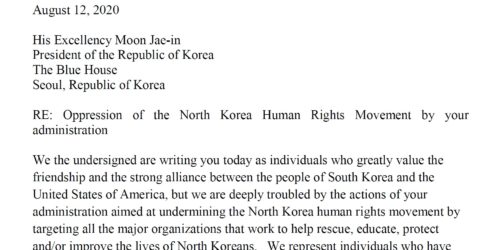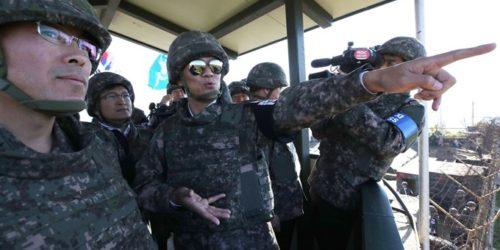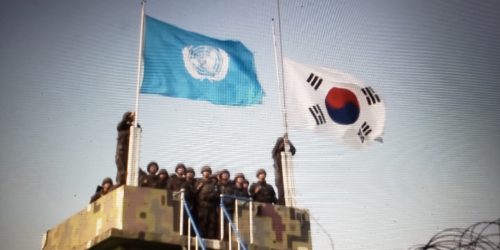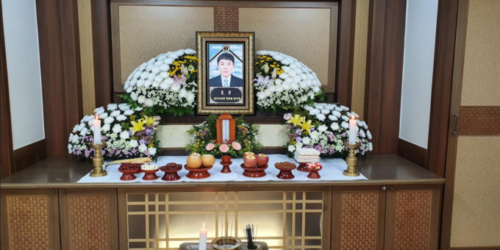Battalion Commander at DMZ Reported Directly to the Blue House when Sending the Two Escapee Fishermen back to North Korea in 2019, Chain of Command Problems
2022-7-6, Tara O
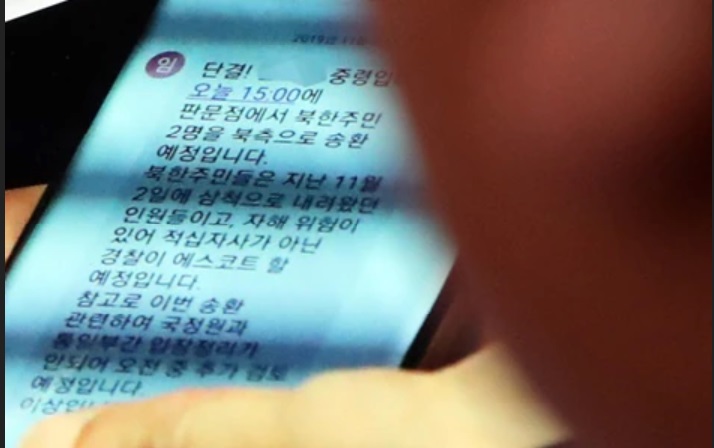
In 2019, a South Korean Lieutenant Colonel who was a battalion commander working at the Joint Security Area (JSA) in the demilitarized Zone (DMZ) reported directly to the Blue House of the plan to send the two defector fishermen to North Korea, skipping the military chain of command. The Lieutenant Colonel sent a text message to Kim Yu-geun (김유근), who was the 1st Deputy to the National Security Advisor (국가안보실 1차장) at the Blue House, about sending the two young defectors to North Korea at 3 p.m. that day.
At the time the text message was checked, Kim Yu-geun was attending a meeting at the National Assembly’s Budget Committee. When Kim was checking his phone message, a photographer captured his phone screen with the message, which is how this issue became known to the public in 2019. Until it was revealed unintentionally through the screen shot photo, which then became known through the media, it had been kept secret by the Moon government. In fact, the Minister of National Defense was reportedly not even aware of it at that time and found out about the two defectors when the issue was reported in the media.
The text message showed:
“At 15:00 (3 p.m.) today, there’s a plan to repatriate two North Koreans to the north side. These North Koreans were the ones who came down to Samcheok (a coastal city in Gangwon Province) this past November 2nd, and there’s a plan to have the police, rather than the Red Cross, escort them due to the danger of self-harm. Additionally, related to the repatriation, the positions of the National Intelligence Service and the Ministry of Unification are not settled well, so an additional review is expected during the morning. That is all.”
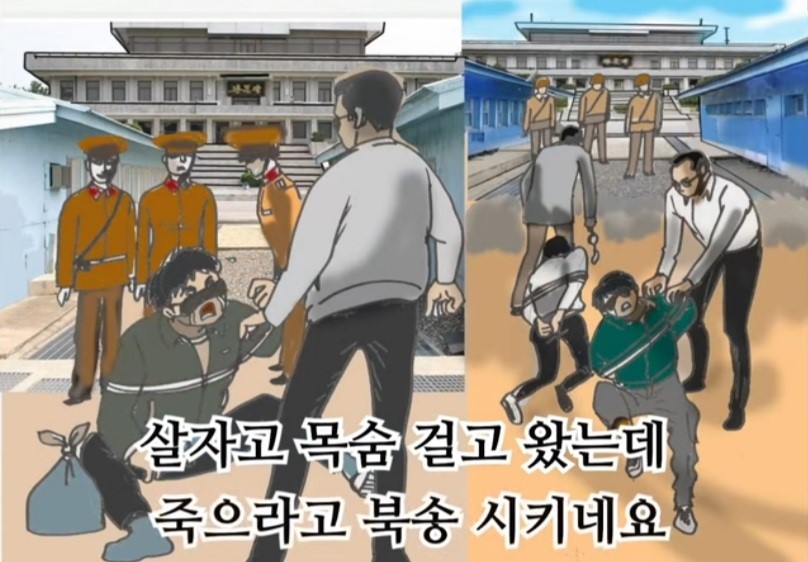
In November 2019, the Moon Jae-in administration sent two defector fishermen back to North Korea. On November 2, 2019, two fishermen escaped North Korea on a fishing boat into South Korean waters and made it clear that they were defecting from North Korea and seeking asylum. On November 5, the Moon Jae-in administration in South Korea sent a message to North Korea via the Liaison Office in Gaesong expressing its decision to forcibly send the two defectors, who were technically South Korean citizens per the South Korean constitution, back to North Korea. On November 6, North Korea responded it will accept the Moon government’s offer.
On November 7, the two fishermen were blindfolded and hands bound and taken to the JSA, where their blindfolds were removed and were handed over to North Korea. Upon seeing the North Koreans at the JSA, the fishermen collapsed, knowing they were being sent to their deaths in North Korea. The Moon administration accused the two fishermen of being murderers, but Dr. Lee Ae-ran, a prominent defector in South Korea, refuted the accusation, saying no one in Kimchaek City (in North Korea) heard of any mass murder of 16 people that the Moon government is alleging, and North Korean authorities also never mentioned murders occurring in Kimchaek nor have they accused the two fishermen of such crime.
That the military at that level would report directly to the Blue House, and skip the chain of command, is a serious problem. By skipping organizations in the chain of command between his battalion and the Blue House, including the Chairman of the Joint Chiefs of Staff and the Minister of Defense, it kept those who are responsible for military activities, in the dark. As a basic military concept, the reporting should have gone up the proper chain of command, through the successive leadership echelons up to reach the president at the Blue House. Any military personnel know the basic concept of the chain of command. A broken chain of command leads to disorder and disunity, because military commanders cannot effectively control and direct their forces, when those forces no longer take direction from and report back to their superior organizations.
After becoming aware of the issue through the media news and recognizing that such jumping of chain of command is a serious breach, the Inspector General (IG) at the Ministry of National Defense (MND) conducted an investigation of the situation upon orders from the MND Minister Jeong Kyeong-doo (정경두). Minister Jeong discovered about the plan to repatriate the two defectors through news. The IG assessed that the front-line battalion commander ignoring the chain of command and reporting the sensitive matter directly to the Blue House National Security Adviser’s Office was a serious matter of “harming discipline.” The IG recommended the soldier be disciplined after it concluded that skipping the chain of command was “a matter of (poor) discipline that has undermined the duty of a soldier who must have a thorough command relationship.”
The Army Ground Operations Command’s disciplinary committee, however closed the case by voting “no charges,” clearing the Lieutenant Colonel of the charge. This conclusion upset the rank and file in the military, prompting comments, such as “Directly reporting (to the Blue House) something that the Minister of Defense did not know is an act of breaking down the command system” and “It is true that there was a lot of talk at the time about whether” the Blue House National Security Adviser’s Office unduly influenced clearing the soldier. Such incidents also impact morale.
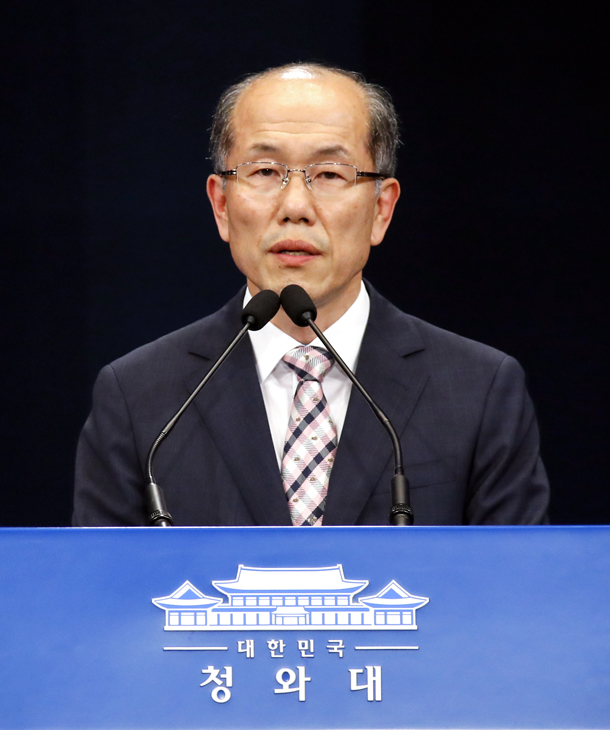
Kim Yu-geun
Kim Yu-geun’s function, as the 1st Deputy, a vice minister-equivalent position, was that of a chief of staff at the National Security Adviser’s office at the Blue House. Kim was not in the military chain of command, and he had no authority to give orders to the Chairman of the Joint Chiefs of Staff (JCS). Working at the Blue House does not automatically grant him such a command authority, but Kim Yu-geun instructed General Park Han-ki (박한기), then the JCS Chairman, to not seize the North Korean ship that crossed the Northern Limit Line (NLL) (another incident). When the North Korean ship was seized, Kim instructed that the JCS Chairman be investigated for “not following (Kim’s) orders.” Cho Kuk’s office, the Office of Senior Secretary for Civil Affairs, then conducted an intense interrogation of General Park for at least four hours in early August 2019 at the Blue House. The interrogators asked why he did not follow Kim’s instructions, to which General Park replied, “As the military assistant to the Minister of National Defense, I follow the orders that came down through the Minister (of National Defense). I think it is inappropriate for me to follow the direct instructions from the 1st Deputy of the Office of the National Security Adviser.” That is indeed the correct answer.
Kim Yu-geun retired as a Lieutenant General (3-star) of the Republic of Korea (ROK) Army in 2015. As such, he should understand exactly what the military chain of command means. Since February 2021, Kim went onto a plum job that is funded by the government and the members of the organization. Kim has taken the position as the chief director of the Military Mutual Aid Association (군인공제회), one of numerous government-funded organizations, where Moon Jae-in had placed many of his supporters. The Military Mutual Aid Association was created when the ROK government passed the Military Personnel Mutual Aid Association Law to provide financial and other assistance to military personnel in need.
The officials at the Blue House have routinely tried to insert themselves in the military chain of command, despite not having that authority. Kim Yu-geun is an example. So was Im Jong-seok, the former Chief of Staff under Moon Jae-in, who behaved as if he were the Commander-in-Chief in sunglasses. The Office of Senior Secretary for Civil Affairs also made blacklists of military personnel. These issues should be investigated and the trust, discipline, and morale should be restored to the military of the Republic of Korea.
